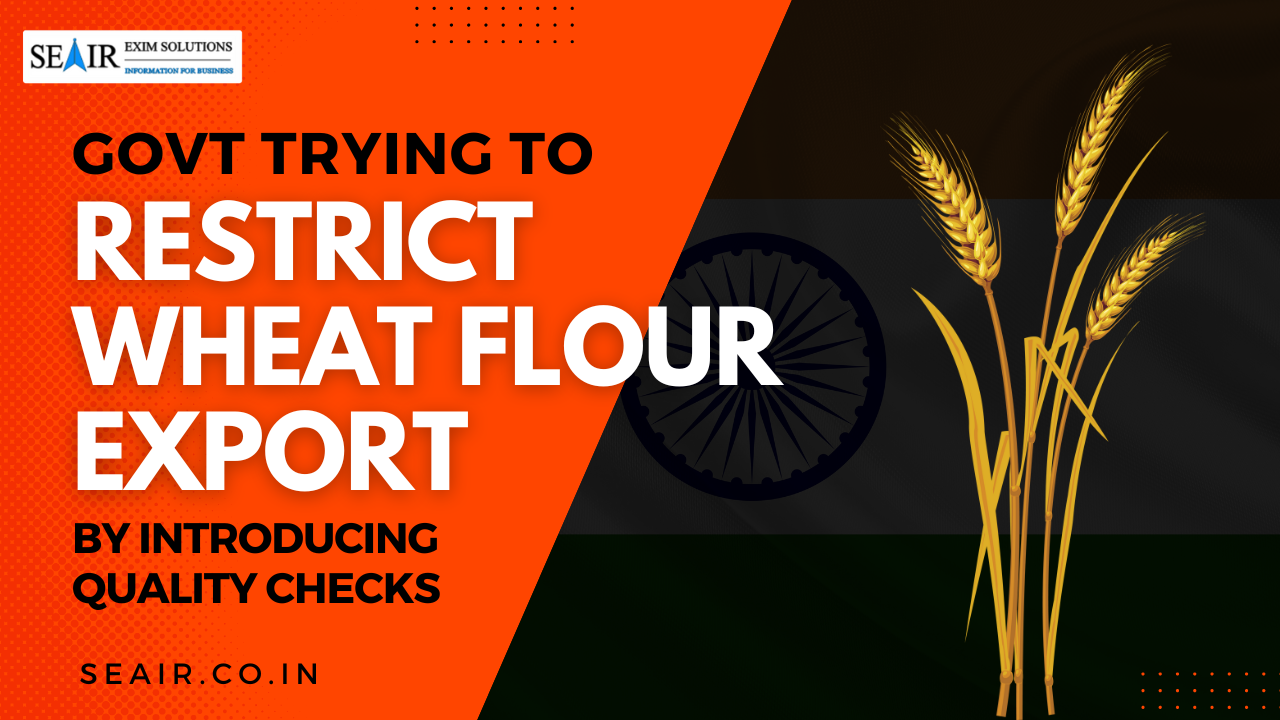
Wheat dealers and processors claim that the government's plan to require quality inspections of wheat flour and other wheat products intended for export is an indirect attempt to limit the amount of wheat that is exported.
The government announced the new policy late on Wednesday. It states that an inter-ministerial committee will conduct the quality check.
The letter stated that "global supply disruptions in wheat and wheat flour have generated many new players, led to price swings, and perhaps raised quality-related difficulties." Therefore, it is essential to preserve the quality of India's exports of wheat flour.
Wheat flour and other wheat products will still fall under the amended policy's "free" export category.
According to the traders and processors ET spoke with, requiring government approval for wheat flour exports is merely an effort to limit their spending without causing a market panic. Quantitative limitations could come next, according to some CEOs.
Industry estimates indicate that India exported 250,000 tonnes of wheat flour and wheat products in the first quarter of 2022–23 as opposed to roughly 500,000 tonnes over the entire year 2021–22.
The move, according to the flour millers who export wheat products, was inappropriate.
According to Ajay Goyal, managing director of Shivaji Flour Mill, "the total quantity of wheat products that India exported in the previous year was not nearly half (0.5%) of the total wheat production of the country."
"It doesn't affect domestic wheat prices in any way."
Some millers believe that this choice will lower the cost and increase the supply of wheat on the local market. Rohit Khaitan, a flour miller from Raniganj in West Bengal, stated that "the price of the mill-quality daara wheat has climbed by 4 percent in Eastern India in the previous one week and the scenario may become tough towards the end of the wheat season."
Millers are concerned that the supply of wheat on the local market may decline after the festival season as the wheat season comes to an end. Whatever quantity of domestic market wheat supplies are currently available in the nation must be managed by the government. It can't be imported, and it can't be quickly cultivated,
In an interview with ET NOW, Union Food & Public Distribution Secretary Sudhanshu Pandey explained that the move was just intended to serve as a filter rather than to restrict the export of wheat flour. "It's really unusual that wheat exports have increased by 300 percent (YoY). Before export, DGFT was required to implement a quality check filter. However, those nations can be given priority if food security is a problem.
Siddhartha Sanyal, chief economist and head of research at Bandhan Bank, commented on the enormous rise in wheat flour exports that has been observed and said that the move was required to combat rapidly rising domestic inflation.
"The action demonstrates the seriousness with which authorities are approaching the problem of domestic inflation.
Some of these measures will have international repercussions and can't be a permanent solution, but to solve the situation at hand, the move might be necessary in the case of global commodity pricing, where we are not a significant player and our power to affect prices is relatively smaller.
Given that exports have increased by about 300 percent (YoY), there will be effects on India's export potential that we may benefit from, but if we have to balance the advantages and drawbacks, handling the immediate inflation-related difficulties is more crucial. Sanyal continued, "FII started pulling money out because of the way interest rates are shaping up and the impact on the rupee, which has created further pressure in terms of flows."
The Center has also taken action in the interim to help customers once more. Leading edible oil associations were recently ordered by the Department of Food and Public Distribution to ensure that the MRP of edible oils be reduced by Rs. 15 with immediate effect.
The administration has also stated that producers and refiners must immediately lower their prices to distributors in order to prevent any dilution of the price decrease. This action is being taken as edible oil prices globally decline. But more importantly, the government is taking steps to prevent more hardship from inflation for ordinary individuals.
Nowadays, a website exists for nearly anything. Having a website enables you to inform more people about its advantages and uses while also expanding your global audience. The best and most trustworthy website for importing and exporting data is Seair Exim Solutions. It offers completely accurate wheat flour export data. for numerous countries. Data is typically preserved to document the pertinent information about imported and exported goods. Many places have heard of and respected this website. As a result, it contains data for both India and other nations.
We have successfully served many reputable clients for Import-Export Data Information Services. Here are some of our clients:
Copyright © 2009 - 2024 www.seair.co.in. All Rights Reserved.
Leave a Comment